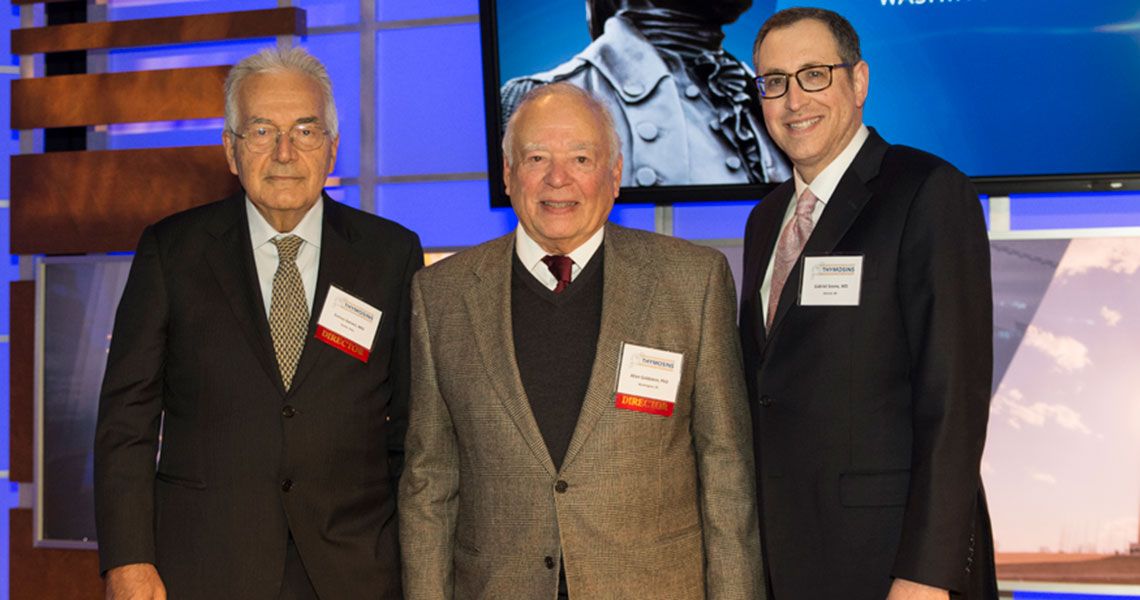At the height of the Fifth International Symposium on Thymosins in Health and Disease at the George Washington University (GW), researchers Luigina Romani, MD, PhD, from the University of Perugia; Enrico Garaci, MD, from the University San Raffaele Roma; and Allan Goldstein, PhD, Professor Emeritus in Residence of Biochemistry and Molecular Medicine at the GW School of Medicine and Health Sciences (SMHS), announced plans for clinical trials of a revolutionary new drug to halt the progression of cystic fibrosis (CF) using Thymosin α1(Tα1).
“All of the studies performed at the pre-clinical level have established the rationale to begin clinical trials,” announced Garaci. “We are starting a Phase I clinical trial involving 24 patients, 12 ages 12 to 18 years, and another 12 over 18 years of age.” The study he said, will be led from San Raffaele, but the clinical trials will take place in Naples, Italy.
“The trial is two months,” Garaci added. “We will make different dosages of Thymosin α1 in such a way that we can test if there really is improvement in lung function as suggested by our preliminary study.”
The clinical trials build on a discovery announced in the April 2017 edition of Nature Medicine. The team reported that Tα1 not only corrects genetic and tissue defects, but also significantly reduces inflammation seen in CF patients. Tα1, a synthetic version of a naturally occurring peptide first isolated from the thymus, corrects the multiple tissue defects found in the lungs and small intestines in a mouse model, as well as the defects in cells isolated from CF patients.
In his address, titled “Unmet Needs in CF and the Potential Role of Thymosin α1,” Bruce Rubin, MD, MBA, FRCPC, from Children’s Hospital of Richmond at VCU, said “Thymosin α1 may be the Swiss Army knife we’re looking for; a one-molecule therapy that acts to potentiate and correct CFTR [cystic fibrosis transmembrane conductance regulator, the mutation in the gene encoding that causes cystic fibrosis] underlying abnormality.”
The three-day symposium, held Nov. 15–17, is the brainchild of Goldstein and Garaci, who take turns hosting the biennial event at their home institutions in Washington, D.C., and Rome. It brings together a growing cadre of scientists enraptured by the promise of the little-known peptide.
Goldstein and colleagues first isolated and characterized Tα1 in 1979 as a biological response modifier with potent immune therapeutic activity. Since then, researchers worldwide have begun exploring the effects of thymosins on a host of diseases and disorders such as cardiovascular disease, neurodegenerative diseases and brain trauma, wound healing, cancer, and cystic fibrosis.
On the symposium’s opening night, Goldstein welcomed attendees to a meeting that would honor not only current scientists involved in advancing breakthroughs in thymosins, but also “the thymosin clan” — the original researchers from the Albert Einstein College of Medicine in New York who began investigating the role of thymosins in the immune system.
“I thought it was important for the scientists that are currently working in the field to get to meet all of the scientists that helped make your work possible,” Goldstein said of the meeting.
Jeffery S. Akman, MD ’81, RESD ’85, vice president of health affairs, Walter A. Bloedorn Professor of Administrative Medicine, and dean of SMHS, also welcomed researchers from around the globe to the symposium.
GW, he said, has been fortunate through the years to have preeminent scientists walk its halls, and “there are very few … who have had the distinction and preeminence of Dr. Allen Goldstein. I want to congratulate Allan and all of you in the field who have been toiling since the 60s and continue to make really important discoveries.”
Following Akman’s remarks, Garaci presented on “Thymosin α1 in the treatment of infectious diseases, cancer, and cystic fibrosis.”
Calling the discovery of thymosins “a beautiful journey,” Garaci told the audience about the history of the protein dating back to AD160 and through the 1970s and 80s, when Tα1 was first approved and then tested.
Following Garaci’s lecture, Gabriel Sosne, MD, associate professor of ophthalmology at the Kresge Eye Institute at Wayne State University in Detroit, spoke about “Thymosin β4 in the treatment of diseases and injuries of the eye.” In his address, Sosne reported that the first Phase III clinical trial, involving more than 600 patients in the United States, using Thymosin β4 in the treatment of Dry eye has now been completed with encouraging results.
Both Garaci and Sosne are recipients of GW’s 2017 Abraham White Lifetime Science Award.



